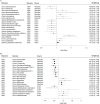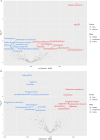Gut microbiome and major depressive disorder: insights from two-sample Mendelian randomization
- PMID: 38977973
- PMCID: PMC11232322
- DOI: 10.1186/s12888-024-05942-6
Gut microbiome and major depressive disorder: insights from two-sample Mendelian randomization
Abstract
Background: Existing evidence suggests that alterations in the gut microbiome are closely associated with major depressive disorder (MDD). We aimed to reveal the causal relationships between MDD and various microbial taxa in the gut.
Methods: We used the two-sample Mendelian randomization (TSMR) to explore the bidirectional causal effects between gut microbiota and MDD. The genome-wide association studies summary results of gut microbiota were obtained from two large consortia, the MibioGen consortium and the Dutch Microbiome Project, which we analyzed separately.
Results: Our TSMR analysis identified 10 gut bacterial taxa that were protective against MDD, including phylum Actinobacteria, order Clostridiales, and family Bifidobacteriaceae (OR: 0.96 ∼ 0.98). Ten taxa were associated with an increased risk of MDD, including phyla Firmicutes and Proteobacteria, class Actinobacteria, and genus Alistipes (OR: 1.01 ∼ 1.09). On the other hand, MDD may decrease the abundance of 12 taxa, including phyla Actinobacteria and Firmicutes, families Bifidobacteriaceae and Defluviitaleaceae (OR: 0.63 ∼ 0.88). MDD may increase the abundance of 8 taxa, including phylum Bacteroidetes, genera Parabacteroides, and Bacteroides (OR: 1.12 ∼ 1.43).
Conclusions: Our study supports that there are mutual causal relationships between certain gut microbiota and the development of MDD suggesting that gut microbiota may be targeted in the treatment of MDD.
Keywords: Brain-gut axis; GWAS; Gut microbiome; Major depressive disorder; Mendelian randomization.
© 2024. The Author(s).
Conflict of interest statement
The authors declare no competing interests.
Figures


References
MeSH terms
LinkOut - more resources
Full Text Sources

